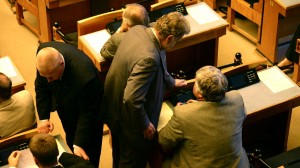
After including an Estonian Green Party intiative, the minority government was able to secure enough votes in the Riigikogu to pass the 2010 budget, which administers excise and utility tax hikes to stay on track for eurozone accession.
TALLINN — The Estonian parliament passed its 2010 budget 55-39 Wednesday evening, staying on-track for eurozone admission with tax increases that could stymie economic recovery.
The budget deficit was reduced to less than 3 percent of gross domestic product, fulfilling the Maastricht criteria to switch to the euro currency in January 2011. But it comes at a cost — increased fuel and electricity taxes which could inflate consumer prices and discourage already weak domestic demand from recovering. The medical fees will also put a crimp on family budgets, which are under duress from the crisis.
The eurozone accession has been a long-standing goal of the Estonian government, and the current conservative coalition is trying to make the crisis a speed bump instead of the detour it’s become for Latvia and Lithuania, whose government finances have also been ravaged by the economic downturn.
“Estonia sees uniting with the eurozone, strict fiscal policies and sustainable financial development as a premise for creating a growing environment for the economy,” Prime Minister Andrus Ansip said at a press conference Wednesday.
With a total pricetag of 89.7 billion krooni (€5.7 billion) budget on Wednesday with 55-39 votes.
Taavi Rõivas, chairman of Riigikogu finance committee and member of Estonian Reform Party characterized the the budget as affordable and a boost to the country’s image abroad, as the budget deficit is one of the smallest in European Union despite the -15 percent gross domestic product.
“We can say that the budget is executable and we don’t have to take big loans as many other countries do,” Rõivas told Baltic Reports, alluding to Estonia’s troubled southern neighbor Latvia.
The idea to increase excise taxes came from the Estonian Greens, which as an opposition party decided to support government coalition in the budget proceedings.
“The original idea was to raise the electricity excise tax more rapidly but through negotiations it was replaced with the proposal to ease the electricity increase and instead include a small increase in several fields including fuel tax and specially-marked liquid fuel tax,” Rõivas said, crediting the excise hike as keeping the budget in line with Maastricht criteria.
Unlike the budgets of the other Baltic states, Estonia was able to increase spending on education and agriculture and designate 40 million krooni (€2.5 million) to help cash-strapped local governments.
However, other opposition members still accused the ruling coalition of “buying off” the Green Party.
“The coalition’s goal with this budget is to assure the switch to Euro and it has to be recognized,” Toomas Raag, a Riigikogu member of the Center Party told Baltic Reports.
Raag said the government shouldn’t pat itself on the back as budgeting maneuvers still left cuts.
“Today the government acts like heroes after giving 15 krooni for rescue workers but let’s remember that the rescue service asked for 22.8 million krooni which causes the cut of 40 jobs,” Raag said.
Criticism of the budget is not confined to the left-wing. The Estonian Taxpayers Association, a non-partisan think tank, fears the tax hikes will spur inflation and damage Estonia’s fragile economy, which may have bottomed out of a freefall that began at the end of 2008.
Lasse Lehis, chairman of Estonian Taxpayers Union is concerned that everything will be more expensive, not only the fuel and electricity prices.
“All the goods being transported and production that consumes electricity will be more expensive,” Lehis told Baltic Reports.
Lehis warned the increased costs will be passed along to consumers and could bankrupt certain companies, especially those in agriculture.
— Baltic Reports reporter Kai Joost contributed to this article.












